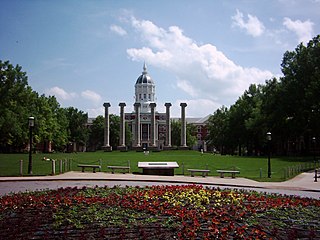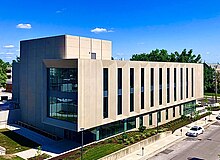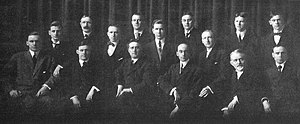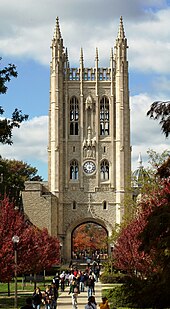
Columbia is a city in the U.S. state of Missouri. It is the county seat of Boone County and home to the University of Missouri. Founded in 1821, it is the principal city of the five-county Columbia metropolitan area. It is Missouri's 4th most populous with an estimated 128,555 residents in 2022.

Faurot Field at Memorial Stadium is an outdoor sports stadium in Columbia, Missouri, United States, on the campus of the University of Missouri. It is primarily used for football and serves as the home field for the Missouri Tigers' program. It is the third-largest sports facility by seating capacity in the state of Missouri, behind The Dome at America's Center in St. Louis and Arrowhead Stadium in Kansas City. In 1972, Memorial Stadium's playing surface was named Faurot Field in honor of longtime coach Don Faurot.

The Missouri Tigers intercollegiate athletics programs represent the University of Missouri, located in Columbia. The name comes from a band of armed Union Home Guards called the Fighting Tigers of Columbia who, in 1864, protected Columbia from Confederate guerrillas during the American Civil War.
Rex Andrew Sinquefield is an American businessman, investor, and philanthropist who has been called an "index-fund pioneer" for creating the first passively managed index fund open to the general public. Sinquefield was also a co-founder of Dimensional Fund Advisors. He is active in Missouri politics.

The Missouri Tigers football program represents the University of Missouri in college football and competes in the Football Bowl Subdivision (FBS) of the National Collegiate Athletic Association (NCAA).

The University of Missouri in Columbia, Missouri, was established in 1839. This later expanded to the statewide University of Missouri System.

University of Missouri Health Care is an American academic health system located in Columbia, Missouri. It's owned by the University of Missouri System. University of Missouri Health System includes five hospitals: University Hospital, Ellis Fischel Cancer Center, Missouri Orthopedic Institute and University of Missouri Women's and Children's Hospital — all of which are located in Columbia. It's affiliated with Capital Region Medical Center in Jefferson City, Missouri. It also includes more than 60 primary and specialty-care clinics and the University Physicians medical group.

Marching Mizzou, M2, or The Big 'M' of the Midwest is the performing marching band for the University of Missouri, founded in 1885 as a college military band. Originally consisting of only 12 members, it is now the largest student organization on the MU campus, drawing students from nearly every major. Marching Mizzou performs at all home football games of the Missouri Tigers football team, in addition to other university events; and expanded Mini Mizzou travels to two away games per season, while the entire band regularly follows the team to conference championship games and bowl games. Marching Mizzou's signature drill "Flip Tigers" has been a well-known tradition of its pre-game show since 1960. It is instructed by University of Missouri School of Music faculty.
The University of Missouri School of Medicine is located in the southern part of the University of Missouri campus in Columbia, Missouri. It was the first publicly supported medical school west of the Mississippi River.
Yoshiaki Onishi is a Japanese-American composer, conductor, and clarinetist. He is a recipient of several international prizes and honors. He currently resides in the United States. In 2018 he won a Guggenheim Fellowship and is currently the Assistant Professor of Music Composition at the University of Delaware School of Music.

The University of Missouri is a public land-grant research university in Columbia, Missouri. It is Missouri's largest university and the flagship of the four-campus University of Missouri System. MU was founded in 1839 as the first public university west of the Mississippi River. It has been a member of the Association of American Universities since 1908 and is classified among "R1: Doctoral Universities – Very high research activity".
Columbia Chorale is an American choir based in Columbia, Missouri. It is a 60 plus men and women's mixed voice classical community choir that performs six or more concerts per season. It is sometimes in partnership and often shares talent with the University of Missouri School of Music.
The University of Missouri College of Engineering is one of the 19 academic schools and colleges of the University of Missouri, a public land-grant research university in Columbia, Missouri. The college, also known as Mizzou Engineering, has an enrollment of 3,204 students who are enrolled in 10 bachelor’s programs, nine master’s programs and seven doctorate programs. There are six academic departments within the College: Chemical and Biomedica Engineering; Civil and Environmental Engineering; Electrical Engineering and Computer Science; Industrial and Systems Engineering; Engineering and Information Technology; and Mechanical and Aerospace Engineering. The college traces its beginning to the first engineering courses taught west of the Mississippi River in 1849. The college was ranked 88th nationally by the U.S. News & World Report in 2016.

In 2015, a series of protests at the University of Missouri related to race, workplace benefits, and leadership resulted in the resignations of the president of the University of Missouri System and the chancellor of the flagship Columbia campus. The moves came after a series of events that included a hunger strike by a student and a boycott by the football team. The movement was primarily led by a student group named Concerned Student 1950. The movement and protests were documented in two films, one made by MU student journalists and the other, 2 Fists Up, by Spike Lee. While it is alleged that bad publicity from the protests has led to dropping enrollment and cutbacks, others have cited budget cuts issued from the state legislature.

The Columns are the most recognizable landmark of the University of Missouri in Columbia, Missouri. Standing 43 feet (13 m) tall in the center of Francis Quadrangle and at the south end of the Avenue of the Columns, they are the remains of the portico of Academic Hall. Along with Jesse Hall, they are one of the most photographed sites in Missouri. The Columns have been at the center of many traditions and events including graduations, concerts, pranks, weddings, and protests. Mizzou's school song mentions the columns, and they have been the setting for a work of fiction. They are a contributing structure to the Francis Quadrangle National Historic District. The columns underwent preservation work in 2017.

George Pearson Smith is an American biologist and Nobel laureate. He is a Curators' Distinguished Professor Emeritus of Biological Sciences at the University of Missouri in Columbia, Missouri, US.

Michael Joseph Budds was an American musicologist, and longtime professor, at the University of Missouri in Columbia, Missouri. In addition to teaching, he wrote and edited a number of works, including a widely used textbook on American popular music. Also a philanthropist, he established the Budds Center for American Music Studies at the University of Missouri School of Music where he taught. He was the first musicologist inducted into the Missouri Music Hall of Fame. Budds taught at Missouri for 37 years, until his death on November 19, 2020.

Mun Young Choi is an American academic. He currently serves as Chancellor of the University of Missouri and President of the University of Missouri System. Prior to his appointment at Missouri he was Provost & Executive Vice President at the University of Connecticut. He has also taught at Drexel University and the University of Illinois at Chicago. He lives in Columbia, Missouri.
The Harry S Truman School of Public Affairs is one of twenty-one schools and colleges at the University of Missouri. Established in 2001, it was previously known as the Department of Public Administration. The school mission is to "advance the knowledge and practice of governance in Missouri, the nation, and beyond by informing public policy, educating for ethical leadership in public service, and fostering democratic discourse among citizens, policy makers, and scholars." As part of the College of Arts and Science, the school awards master's, and doctoral degrees. The school is named after Missourian and U.S. President, Harry S. Truman. It was ranked the 38th best public affairs program by U.S. News & World Report in 2020.
The Mizzou College of Health Sciences is the University of Missouri system’s only school of health professions and the state’s only public health program located on a health sciences campus. Its mission is to improve the health and well-being of others.























